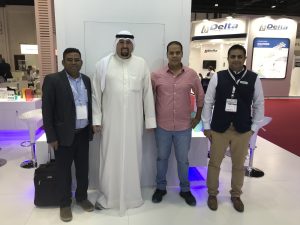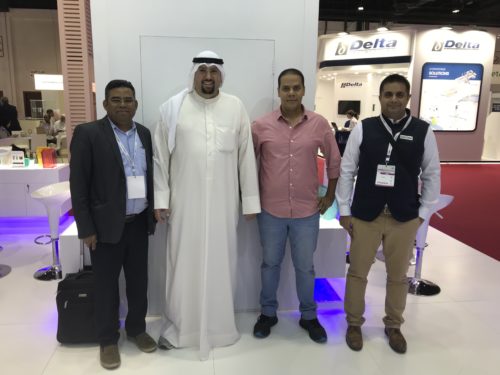 Vikram Fotedar (VF):
Vikram Fotedar (VF):
What’s new at K-Pak? Do you have any plans for expansions for K-Pak?
Saud Al Serri (SAS): We are focusing on launching a new project such as microwavable. That’s the reason we’ve introduced the polypropylene in our mix of products. We’ve been using it for a couple of years but now some of our clients are demanding it. We have different locations with production facility such as UAE, Kuwait and Saudi Arabia. Our majority clients are here within the GCC region and we meet all their needs.
VF: What do you see happening in the area of the polystyrene foam products? Do you face regulatory issues in anyways?
SAS: Yes we do face regulatory issues in all our locations of Kuwait, UAE and Saudi Arabia. But all our products are certified by the ISO. We have four ISO certifications. We also have food grade certifications from these three countries Our products have no issues of contamination with either hot or cold food, and no residual carrying monomers. We export our products to Europe, Asia and Africa and all these countries require all of these certificates. Foam products are well accepted in Europe and the USA.
VF: A new development – triple trays with regular PET so the liquid stays at the bottom – is making its way into the market. Are you working on producing such trays?
SAS: Yes, we are working on it.
VF: So where do you see the solution of recycling?
SAS: Solution is not to use two different materials – use PET alone. Another solution is also to seal PET with PET and PE with PE. There are solutions but changing the mindset of people is very difficult.
VF: Can you tell us a little bit about how your company is structured in the three areas and what is your market share of production in Kuwait as compared to UAE and Saudi?
SAS: We have more than 60% market share in the foam products in the UAE and I believe in the GCC as well. Regarding PE and PET, we are relatively we are quickly grabbing that market too. Currently, we have close to 25-30% market share there.
VF: Do you have manufacturing set up in UAE as well as in Kuwait?
SAS: We used to manufacture in UAE as well but now we are concentrating on productions at our plants in Kuwait and Saudi. In UAE we do foam and foam gas.
VF: For some reason, the world sees foam with negative eyes. Why?
SAS: The government authorities in the UAE, Kuwait and Saudi accept it. No legal authorities have banned it. So there’s no issue there.
But to answer your questions, I see it from this point. From what the market scenario presents, for 1-million grains of polystyrene it will give you a volume of 30,000. If you take the same amount from PE or PET it will give you 100,000.
So, if you see, you make more with the same amount of PT or PET or other materials. Both can be recycled 20%.
That’s perhaps the reason.
VF: Residuals of Styrene monomer might be a health hazard?
SAS: There is nothing to prove it. They use it everywhere in the US. Paper cups has PE coating or wax in it and the foam cups have polystyrene. So either way, it is plastic.
Wax is worse than plastic because it can melt and come into food contact. If there were no disposable, single-use plastic packs, the food wastage impact will be 10 times higher than the tiny impact of plastics has.
The disposable plastics can be recycled to an extent but the food wastage due to large portion packs, which may not be plastic, is difficult to manage.
VF: How do you manage to convince customers about the safety of using foam for food and drink?
SAS: We have lab tests. Serious buyers always consider genuine facts.



